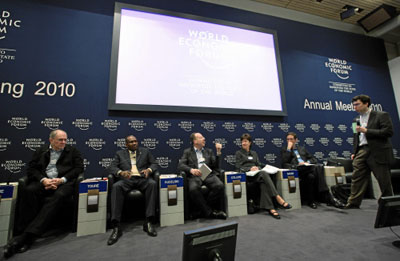|
Geneva, 15 April 2010 |
Not an official record |
N°3 |
||||||||||||||||||||||||||||||||||||||||||||||||||||
| Next » | ||||||||||||||||||||||||||||||||||||||||||||||||||||||
|
ITU’s role in implementing WSIS outcomes
The Council Working Group on the World Summit on the Information Society (WG-WSIS) will hold another meeting in June 2010 to finalize its report to the Plenipotentiary Conference, to be held in Guadalajara, Mexico, from 4 to 22 October 2010 (PP10). This conclusion was reached in the Council’s Plenary on 15 April, following presentation of the group’s report ( Document C10/24) by its Chairman, Vladimir Minkin of the Russian Federation.The work of WG-WSIS is conducted in line with Resolution 140 of the Plenipotentiary Conference (Antalya, 2006). In particular, the group is called upon to “facilitate membership input and guidance on the ITU implementation of relevant WSIS outcomes and to elaborate proposals to the Council that may be necessary for adapting ITU to its role in building the information society”. Resolution 140 also covers ITU’s work on WSIS at three levels. One is an overall facilitation role in the multi-stakeholder implementation of the Geneva Plan of Action and the Tunis Agenda for the Information Society, alongside the United Nations Educational, Scientific and Cultural Organization (UNESCO) and the United Nations Development Programme (UNDP). Another role for ITU is as sole facilitator for WSIS Action Lines C2 on "information and communication infrastructure" and C5 on "building confidence and security in the use of information and communication technologies (ICT). The third is as a partner and stakeholder in the implementation of all other relevant WSIS Action Lines notably, C1, C3, C4, C7, and C11 (see table for details).
The report presented by Dr Minkin was drawn up at the group’s 16th meeting, held from 2-4 February 2010 and attended by some 90 delegates, representing ITU Member States and Sector Members. The Council expressed appreciation for the report and for Dr Minkin’s leadership of WG-WSIS. Some of the report’s key points discussed in Thursday’s Plenary are highlighted below.
Dedicated Group on Internet-Related Public Policy Issues In its report, the Dedicated Group requests the secretariat, among other things, to:
Some Member States believe that the Dedicated Group should be
independent. Others feel that the work of this group and of WG-WSIS
should be merged. Opinions are also divided on who should deal with
Internet-related public policy issues. The onus is now on PP-10 to
decide on the way forward for these groups, their scope, future work and
activities. The secretariat believes that the work of WG-WSIS and the
Dedicated Group is linked, and could continue in a combined way. Comments from the floor
Several delegates took the floor to comment on all three documents
(C10/24,C10/53 and C10/24 Addendum 1). For
example, Turkey backed the drawing up of road maps for Action Lines C2,
C5 and C6 only. This view was supported by the United States, which
underlined that it would continue to support ITU’s work in these areas,
adding that any high-level segment at PP-10 should focus on Action Lines
C2, C5 and C6. On the issue of rebranding, the United States pointed to
the need to revisit the categories of ITU membership, as was clearly
articulated by the Secretary-General, Dr Hamadoun Touré, in his state of
the Union address (see Highlights No. 1 of 13 April). The councillor
from the United States went on to say that he considered this point to be an important
element for rebranding ITU so that it remains relevant to the ICT
industry. In addition, he requested to hear the Secretary-General’s
views on cybersecurity, as reported from the World Economic Forum in
Davos.Canada, supporting the views of Turkey and the United States, also underlined the need for the Union to optimize resources involved in the various WSIS activities. In this regard, it would be useful to evaluate the impact of WSIS outcomes on ITU in the run up to WTDC-10 and PP-10. This, Canada said, would be very important for the financial plan, stressing that duplication of effort must be avoided, not only within the Union, but also with other institutions. 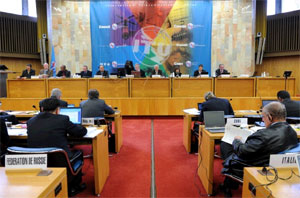 The
Syrian Arab Republic (participating in observer status) expressed
support for all points raised in Document C10/53, including the plan of
action. While noting that ITU should not be over burdened, the Syrian
Arab Republic did not agree with Turkey’s view that other WSIS action
lines, where ITU was listed as partner, were marginal for the Union. The
Syrian Arab Republic (participating in observer status) expressed
support for all points raised in Document C10/53, including the plan of
action. While noting that ITU should not be over burdened, the Syrian
Arab Republic did not agree with Turkey’s view that other WSIS action
lines, where ITU was listed as partner, were marginal for the Union. Germany expressed reluctance to the idea of developing more road maps on WSIS action lines for which other agencies have the lead role, stating that given the nature of WG-WSIS as a closed group, it has proved difficult to involve other players. Also, that delegation expressed discomfort with the proposal to draw up road maps for action lines for which other agencies have the leadership role, with ITU as partner. Turkey requested information on how ITU is reporting its work on WSIS to the United Nations Group on the Information Society (UNGIS). This group is expected to develop a road map to give an overview of the implementation of WSIS outcomes throughout the UN system up to 2015. ITU is a permanent member of UNGIS, and shares its rotating chairmanship. Meanwhile, Ghana stressed the need to integrate the outcomes of the Connect Summits in the Broadband Commission for Digital Development announced by the Secretary-General at the beginning of the Council session. Conclusion
Following these comments, the Council noted Document C10/24 and its
Addendum 1. A meeting of WG-WSIS and the Dedicated Group on
Internet-Related Public Policy Issues will be held in June 2010 to
finalize these reports under the supervision of the Chairman of the
Council. The final report of the Dedicated Group would be incorporated
into that of WG-WSIS. The merged report would then be submitted to the
final meeting of the Council, to be held in Guadalajara a day before
PP-10 begins. Regarding the Russian contribution (Document C10/53), the comments from the councillors have been noted and will be included in the summary record of the Plenary. Meanwhile, the secretariat is requested to provide a report (stocktaking) on the extent to which WSIS outcomes have been integrated into ITU work programmes, particularly within ITU-D. ITU’s lead role in cybersecurity
Highlighting ITU's
role as sole facilitator for WSIS Action Line 5 on building confidence
and security in the use of ICT, Dr Touré shared with the Council his
sound bites at a debate of the World Economic Forum in Davos in January
2010, where experts said nations must now consider when a cyber attack
becomes a declaration of war.At this event, Dr Touré said that the
world needed a treaty to prevent cyberattacks becoming an all-out war.
He proposed a treaty in which countries would engage not to strike
against one another. "A cyber war would be worse than a tsunami." At the
time Dr Touré made this comment, two countries were almost at cyberwar,
he told the Council. The Secretary-General’s sound bites on
cybersecurity were widely reported by the world’s media, putting ITU in
the limelight. Broadband to put ITU back on the map
Pakistan stressed that cybersecurity and broadband are key areas, where ITU can help. In a country of 170 million people, but only 600 000 broadband users, Pakistan, the delegate added, has a huge potential and opportunity for growth. Cuba expressed firm support for the Secretary-General’s vision so that ITU can carry out all activities related to e-health, e-education and other e-applications. Mali sought to know what has been achieved so far by ITU with regard to MDGs, and what is left to be done that ITU can do. A progress report, Mali said, would help set priorities on which ITU will focus over the next four years. Bulgaria commented that the Internet is a very difficult diplomatic issue. He recalled when, as an ITU staff member, attending a Council session he had been shocked to hear administrations say that the Internet was not the mandate of ITU. Now, he said, ITU has to work in a very difficult environment because of that lack of vision. “The Council had failed to see the value of the Internet,” the delegate noted. Now, to find out more on the functioning of the Internet, we must not be too rigid, and should invite many heavyweight players that operate the Internet today and work with them in a pragmatic way, Bulgaria advised. In addition, “the Secretary-General is bringing us a new idea on broadband, which is fully within the mandate of ITU. We must seize this opportunity and not make the same mistake again,” Bulgaria underlined. For its part, Algeria called on ITU to fine-tune its ICT Development Index to reflect countries’ actual situations. ITU Internet activities: Resolutions 101, 102 and 133
Alexander Ntoko, Head of ITU’s Corporate Strategy Division, presented
Document C10/13 on ITU’s Internet activities carried out in accordance
with PP-06 Resolutions 101 and 102, covering Internet protocol-based
networks, and ITU’s role in the management of Internet resources and in
international public policy regarding the Internet, as well as
Resolution 133 on the role of administrations in the management of
internationalized (multilingual) domain names (IDN). He highlighted the
8 sections of the report, which:
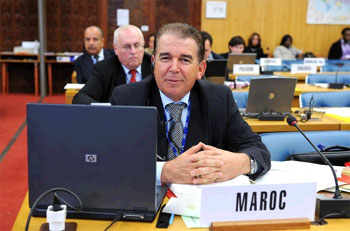 Australia requested for information on ITU’s representation in the
meetings of the Internet Corporation for Assigned Names and Numbers
(ICANN). Germany called for less tension between ITU and ICANN. The
Secretary-General said that ITU continues to contribute to the work of
ICANN and that dialogue was frank. Australia requested for information on ITU’s representation in the
meetings of the Internet Corporation for Assigned Names and Numbers
(ICANN). Germany called for less tension between ITU and ICANN. The
Secretary-General said that ITU continues to contribute to the work of
ICANN and that dialogue was frank.Morocco thanked ITU for its support to obtain the “.ARAB” domain name. The Arab region had officially requested the assistance of ITU for the creation of the .ARAB domain name, including expert assistance on policy and capacity building to ensure that the region benefits fully. ITU is contributing to ICANN’s development of the new gTLD programme. The Council noted the activities described in the report (Document C10/13). ITU Visitors’ Centre
ITU will soon become the home of a new state-of-the-art centre, where
visitors will explore the history and impact of ICT upon people’s lives worldwide, and
catch a glimpse of the exciting future and ITU’s role in helping to
connect the world. The project to establish a Visitors’
Centre at ITU
headquarters was endorsed by the Council at its session in 2008.Presenting a progress report to the Council, Luiz Fernando Ferreira da Silva, Head of ITU’s External Affairs and Corporate Communication Division, said that the Secretary-General and the Director-General of the Telecommunications Regulatory Authority (TRA) of the United Arab Emirates Mohamed Al Ghanim signed an agreement for a voluntary contribution to the project on 8 November 2009 in the UAE capital, Abu Dhabi. The agreement sees the Government of the United Arab Emirates and TRA become founding partners of the Centre, through a donation of USD 2 million towards its design and construction. 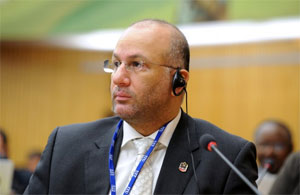 Mr Al Ghanim said that the centre is an exciting and distinctive
initiative of ITU that will enable visitors to appreciate the innovation
of the ICT industry. “The United Arab Emirates and TRA feel privileged
and honoured to be part of this ITU project,” he added. Mr Al Ghanim said that the centre is an exciting and distinctive
initiative of ITU that will enable visitors to appreciate the innovation
of the ICT industry. “The United Arab Emirates and TRA feel privileged
and honoured to be part of this ITU project,” he added.Planned to open in early 2011, the new centre will be located on the 2nd floor of the Montbrillant building, and will be accessible to the general public, ITU delegates and visiting experts. Alongside its permanent exhibition, the centre will host temporary exhibitions on cutting-edge technologies. Free-online access to ITU-R Recommendations and to the basic texts of the Union
In 2008, the Council approved a six-month trial period (January-June
2009) for free-online access to ITU-R Recommendations and to the basic
texts of the Union to ITU Member States, Sector Members and Associates.
At its 2009 session, the Council decided to defer any decision until a
later time, on the understanding that the trial period for this free-online access would be extended to PP-10. It also requested the
secretariat to undertake an in-depth study of the subject and on the
financial impact, and submit the issue to PP-10.Richard Barr, Chief of ITU’s Administration and Finance Department, presented Document C10/22, giving a brief overview of the actual impact on revenue for the year 2009. Mr Barr said that, for that year, the financial impact of the trial period of free access to ITU-R Recommendations resulted in a decrease estimated at CHF 291 000 in sales of publications income. He added that the financial impact was negligible with regard to the basic texts because all members receive a hard copy of this document. If ITU members continue to access ITU-R Recommendations free of charge over the 2010-2011 biennium, an additional projected reduction in income from the sales of publications would be in the magnitude of CHF 600 000. The loss of income for the 2012-2015 financial plan would be in the order of CHF 1.2 million, according to ITU projections. Brazil also presented its Document C10/52, which provides an analysis on the reasoning for the need to grant free-online access to ITU-R Recommendations. This document analyses the ITU Constitution, the Strategic Plan and goals of the Union, several Council Resolutions and the financial impacts of providing free-online access to ITU-R Recommendations. Brazil argues that the texts cited above clearly indicate that “the purposes of ITU converge with facilitating access to its work”. ITU-R Recommendations are studied, discussed and drafted by Member States and Sector Members at the seven study groups of ITU-R, the document says. It goes on to note that: “Each one of the seven ITU-R study groups hold several meetings every year, so developing countries and their Sector Members have both financial and human resources constraints in participating in all of them. Most of the least developed countries and Small Islands Developing States do not attend these meetings.” So, “if ITU wishes for its work to have a truly global nature and to guarantee interoperability and interconnection of telecommunication services worldwide, it must make sure that all of its members have access to these Recommendations and the know-how to implement them”. Brazil also proposed a draft decision, to be submitted to PP-10. It stresses the need to “allow free-online access to the portable document format (PDF) versions of published ITU-R Recommendations to the ITU membership, universities, research institutions, centres of excellence, students and the general public on a permanent basis”. 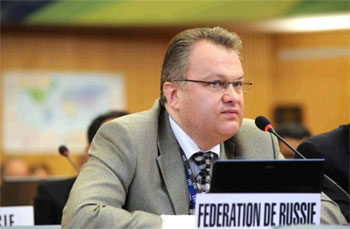 The Russian Federation presented
Document C10/57
(Free-online access to the basic texts of the Union, including the
Administrative Regulations, and to ITU-R Recommendations). It puts
forward an analysis of the linkage between the obligations of Member
States stemming from the provisions of the Constitution, Convention and
Administrative Regulations and access to the texts of these instruments.
In addition, the Russian Federation proposed that this Council session
should: The Russian Federation presented
Document C10/57
(Free-online access to the basic texts of the Union, including the
Administrative Regulations, and to ITU-R Recommendations). It puts
forward an analysis of the linkage between the obligations of Member
States stemming from the provisions of the Constitution, Convention and
Administrative Regulations and access to the texts of these instruments.
In addition, the Russian Federation proposed that this Council session
should:
Councillors’ views
Several councillors said that no decision should be taken at this point
on the issue of free-online access to ITU-R Recommendations and to the
basic texts of the Union. For Switzerland, Saudi Arabia, Australia and
Canada, such a decision will need to be examined carefully and taken by
PP-10 itself. Meanwhile, the financial implications should be taken into
account when elaborating the Financial Plan.A number of councillors stressed that any decision for free access should be similar for all ITU Sectors. Others, while seeing the benefit of free access for members described the idea as paradoxical, particularly at a time when the Union is trying to balance its financial plan and to establish a solid financial base. A pricing policy clearly distinguishing between members and non-members should be developed, they said. The concept of intellectual property should also be studied. Sweden, supporting free-online access called for input documents to PP-10. Malaysia stressed the importance of the marketing and sale functions. The delegation called for a review of issues related to the cost of translation, price discount, cost recovery, statistical and high-value publication. Models should be studied that focus on value rather than cost. Cuba and several other delegations suggested that a decision on free access could be taken once a decision has been taken on the financial plan. Saudi Arabia emphasized the need to find a balanced approach to the issue and proposed that the secretariat should be requested to submit a paper to PP-10. This view was supported by several delegations, with Morocco adding that a more “enriched” paper should be drawn up for PP-10. Conclusion
Noting the many comments from the floor, the Council Chairman concluded:
“This issue obviously cannot be resolved here today and must be referred
to PP-10 to be considered carefully. I recall that the financial
implications of providing free-online access will be reviewed by the
Group on the Financial Regulations and Related Financial Management
Issues (FINREGS) in June 2010.” The Chairman then ruled that all
comments made on the issue will be reflected in the summary record. The
Council noted Documents 22, 52, and 57 and requested the secretariat to
provide “a more enriched paper” on the issue to PP-10.Status of preparations for the Plenipotentiary Conference
Doreen Bogdan-Martin, Chief of ITU’s Strategy, Planning and Membership
Department, introduced
Document C10/34, which updates the Council on
the current status of preparations for the Plenipotentiary Conference,
to be held in Guadalajara. This venue, Ms Bogdan-Martin said, was
confirmed on 1 March 2010, when the consultation of all ITU Member
States concluded with 112 positive replies. The Host Country Agreement between the Government of the United Mexican States and ITU relating to the holding, organization, and financing of the Plenipotentiary Conference was concluded in Guadalajara, Mexico on 23 June 2009 and signed by the Secretary-General and Juan Francisco Molinar Horcasitas, Minister of Communications and Transports. A Supplement amending this Host Country Agreement was signed in Mexico City on 9 March 2010. Invitations to PP-10 and circular letters have been sent to the membership. These include the circular letter of 3 September 2009 on proposals for the work of the Conference and Circular Letter 198, which was sent on 2 March 2010 on credentials for delegations to PP-10. 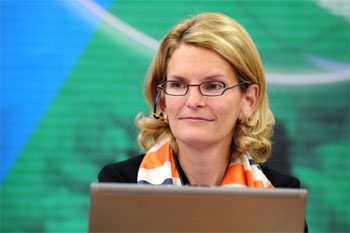 Ms Bogdan-Martin also presented a proposed structure of PP-10 as
follows: Ms Bogdan-Martin also presented a proposed structure of PP-10 as
follows:
Dr Touré, recalling his State of the Union address, said, “we can boost the visibility of the ITU Plenipotentiary Conference and enrich and inform the debate, by devoting the opening day to a High-Level Segment (HLS)”. It would focus on “Our Shared Broadband Future”, as a theme. “Of course, other UN agencies and programmes devote part of their governing bodies to high-level consideration of strategic issues and the proposed HLS would enable PP-10 to gather and incorporate high-level visions from the start,” the Secretary-General explained. He proposed to invite a number of Heads of State and CEOs from ITU Sector Members to share their vision for the future of ICT and broadband Internet. “We are discussing the arrangements with our Mexican hosts and will be providing more information to you as soon as it is known,” he told the Council. In addition, side thematic workshops will be organized during the second week of PP-10. Some of the topics proposed for these workshops include: cybersecurity and climate change. Dr Touré expressed gratitude to the Mexican Administration “for their support and excellent cooperation”, adding that “our combined team work will ensure a very successful PP-10”. Mexican delegation responds
Mexico’s Ambassador to the United Nations Office in Geneva, Juan José
Gómez Camacho, along with the Vice-Minister of Communications, Gabriela
Hernández Cardoso, and the Minister of Tourism of the state of Jalisco
Aurelio López Rocha expressed
gratitude for their country being selected to host PP-10 and wished
everyone a warm welcome to a land well-known for its rich culture.
Guadalajara is the capital of the state of Jalisco, located in the centre of Mexico. It is the country's second-largest city, with a population of 3.5 million and is one of Latin America's wealthiest urban centres. It embodies nothing less than the soul of the nation. Guadalajara is affectionately known as La Perla del Occidente (or “Pearl of the West”). It is home to mariachis and tequila. It is the proud host city of many important events, including the 2011 Pan American Games. Submission of documentation to Council sessions
Bulgaria and Canada submitted a draft decision (see Document C10/42)
that highlights the importance of timely submission of contributions,
not only to ensure that translation deadlines are respected and to
minimize significant cost overruns, but also to ensure that meeting
participants have sufficient time to consider the nature of the issues
raised in such contributions. One of the proposals is to establish a
deadline by which documents should be submitted “…no later than ten
working days before the opening of a Council session to ensure timely
translation and their thorough consideration during that Council
session.”After some debate it was suggested to change the wording “…no later than ten working days….” to “…no later than 14 calendar days...”. The Council also decided to set up a drafting group to review the draft decision and report back to Plenary.
|
||||||||||||||||||||||||||||||||||||||||||||||||||||||


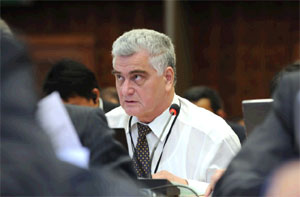 The
Russian Federation also presented its proposals on ITU’s
implementation of WSIS outcomes (see
The
Russian Federation also presented its proposals on ITU’s
implementation of WSIS outcomes (see 